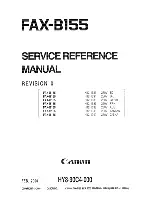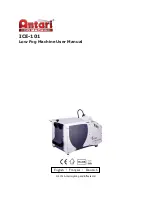
118
KX-FP365CX / KX-FM388CX
12.5.5. Digital Board Section
When the unit fails to boot up the system, take the troubleshooting procedures very carefully. It may have a serious problem.
The symptom: No response when the power is turned on. (No LCD display, and keys are not accepted.)
The first step is to check the power source. If there is no problem with the power supply unit, the problem may lie in the digital
unit (main board).
As there are many potential causes in this case (ASIC, DRAM, etc.), it may be difficult to specify what you should check first. If
a mistake is made in the order of checks, a normal part may be determined faulty, wasting both time and money.
Although the tendency is to regard the problem as a serious one (IC malfunction, etc.), usually most cases are caused by solder
faults (poor contact due to a tunnel in the solder, signal short circuit due to solder waste).
Note:
1. Electrical continuity may have existed at the factory check, but a faulty contact occurred as a result of vibration, etc., during
transport.
2. Solder waste remaining on the board may get caught under the IC during transport, causing a short circuit.
Before we begin mass production, several hundred trial units are produced at the plant, various tests are applied and any mal-
functions are analyzed. (In past experiences, digital IC (especially DRAM and FLASH ROM) malfunctions are extremely rare
after installation in the product.)
This may be repaired by replacing the IC, (DRAM etc.). However, the real cause may not have been an IC malfunction but a sol-
dering fault instead.
Soldering faults difficult to detect with the naked eye are common, particularly for ASIC and RA (Resistor Array). But if you have
an oscilloscope, you can easily determine the problem site or IC malfunction by checking the main signal lines.
Even if you don’t have such a measuring instrument, by checking each main signal line and resoldering it, in many cases the
problem will be resolved.
An explanation of the main signals (for booting up the unit) is presented below.
Don’t replace ICs or stop repairing until checking the signal lines.
An IC malfunction rarely occurs. (By understanding the necessary signals for booting up the unit, the “Not Boot up”
display is not a serious problem.)
What are the main signals for booting up the unit?
The ASIC (IC1) controls all the other digital ICs. When the power is turned on, the ASIC retrieves the operation code stored in
the FLASH ROM (IC6), then follows the instructions for controlling each IC. All ICs have some inner registers that are assigned
to a certain address.
It is the address bus by which the ASIC designates the location inside each IC. And the data bus reads or writes the data in
order to transmit the instructions from the ASIC to the ICs.
These signal lines are all controlled by voltages of 3.3V (H) or 0V (L).
Summary of Contents for KX-FM388CX
Page 12: ...12 KX FP365CX KX FM388CX 6 Technical Descriptions 6 1 Connection Diagram ...
Page 14: ...14 KX FP365CX KX FM388CX 6 2 1 General Block Diagram ...
Page 16: ...16 KX FP365CX KX FM388CX 6 3 2 Memory Map ...
Page 25: ...25 KX FP365CX KX FM388CX 6 4 2 Block Diagram ...
Page 27: ...27 KX FP365CX KX FM388CX ...
Page 78: ...78 KX FP365CX KX FM388CX Countermeasure ...
Page 79: ...79 KX FP365CX KX FM388CX REFERENCE Test Mode P 63 ...
Page 80: ...80 KX FP365CX KX FM388CX REFERENCE Test Mode P 63 ...
Page 81: ...81 KX FP365CX KX FM388CX REFERENCE Test Mode P 63 ...
Page 82: ...82 KX FP365CX KX FM388CX REFERENCE Test Mode P 63 ...
Page 83: ...83 KX FP365CX KX FM388CX ...
Page 84: ...84 KX FP365CX KX FM388CX ...
Page 85: ...85 KX FP365CX KX FM388CX REFERENCE Test Mode P 63 ...
Page 89: ...89 KX FP365CX KX FM388CX ...
Page 114: ...114 KX FP365CX KX FM388CX ...
Page 121: ...121 KX FP365CX KX FM388CX I O and Pin No Diagram ...
Page 124: ...124 KX FP365CX KX FM388CX 12 5 5 2 NG Example ...
Page 130: ...130 KX FP365CX KX FM388CX 12 5 8 2 Troubleshooting Flow Chart ...
Page 136: ...136 KX FP365CX KX FM388CX 12 5 12 Thermal Head Section Note Refer to Thermal Head P 26 ...
Page 139: ...139 KX FP365CX KX FM388CX 13 Service Fixture Tools ...
Page 142: ...142 KX FP365CX KX FM388CX 14 1 2 How to Remove the Thermal Head ...
Page 144: ...144 KX FP365CX KX FM388CX 14 2 2 How to Remove the Pickup Roller ...
Page 145: ...145 KX FP365CX KX FM388CX 14 2 3 How to Remove the Paper Exit Roller and Cassette Lever ...
Page 146: ...146 KX FP365CX KX FM388CX 14 3 Lower Cabinet Section 14 3 1 How to Remove the Bottom Frame ...
Page 147: ...147 KX FP365CX KX FM388CX 14 3 2 How to Remove the Digital Analog Interface and Sensor Boards ...
Page 148: ...149 KX FP365CX KX FM388CX 14 3 4 How to Remove the Gear Block and Separation Roller ...
Page 149: ...148 KX FP365CX KX FM388CX 14 3 3 How to Remove the Power Supply Board and AC cord ...
Page 150: ...150 KX FP365CX KX FM388CX 14 3 5 How to Remove the Component parts of Gear Block ...
Page 153: ...153 KX FP365CX KX FM388CX 14 4 3 How to Remove the Separation Rubber ...
Page 154: ...154 KX FP365CX KX FM388CX 14 5 Installation Position of the Lead Wires ...
Page 155: ...155 KX FP365CX KX FM388CX ...
Page 168: ...168 KX FP365CX KX FM388CX 16 1 4 Power Supply Board 16 1 5 Interface Board ...
Page 170: ...170 KX FP365CX KX FM388CX 16 3 Test Chart 16 3 1 ITU T No 1 Test chart ...
Page 171: ...171 KX FP365CX KX FM388CX 16 3 2 ITU T No 2 Test Chart ...
Page 172: ...172 KX FP365CX KX FM388CX 16 3 3 Test Chart ...
Page 173: ...173 KX FP365CX KX FM388CX Memo ...
Page 194: ...194 KX FP365CX KX FM388CX 20 1 2 Operation Cover Section ...
Page 195: ...195 KX FP365CX KX FM388CX 20 1 3 Back Cover Section ...
Page 196: ...196 KX FP365CX KX FM388CX ...
Page 197: ...197 KX FP365CX KX FM388CX 20 1 4 Upper Cabinet Section ...
Page 198: ...198 KX FP365CX KX FM388CX 20 1 5 Lower Cabinet Section ...
Page 199: ...199 KX FP365CX KX FM388CX 20 1 6 Gear Block Section 20 1 7 Screws ...
Page 200: ...200 KX FP365CX KX FM388CX 20 1 8 Accessories and Packing Materials ...
















































